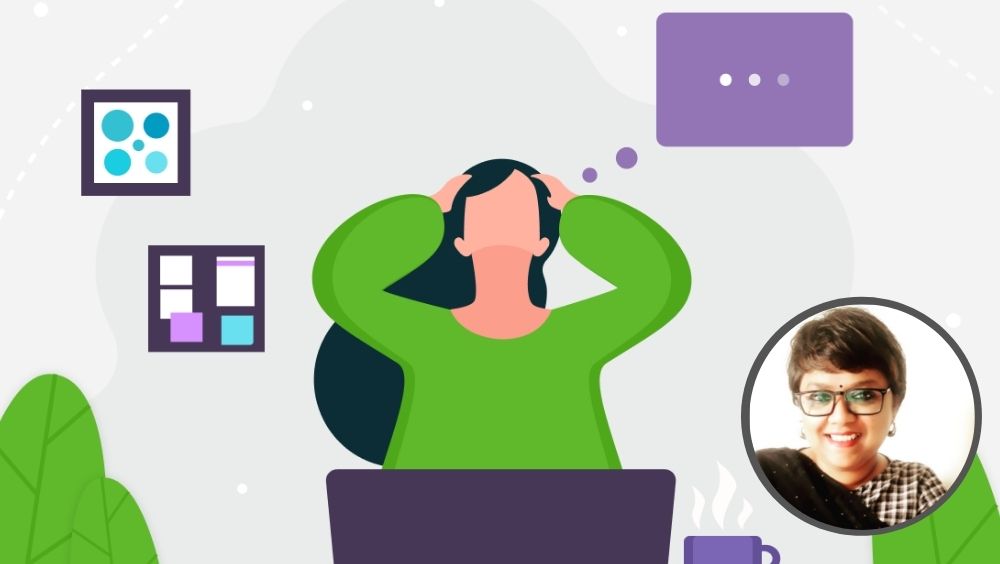One pandemic, lakhs dead, a planet under lockdown – the world seems to have changed drastically in the last two years. From office-goers setting up workstations at home and schools and colleges closing down, almost suddenly, everything, including classes, seem to have shifted online. This forced lockdown affected old and young alike, leading to a huge increase in stress, depression and other mental health issues. How did the lockdown affect people across ages and strata of society? What can be some ways to manage the mental health crises? –AMRI’s Consultant Clinical Psychologist, Sahely Gangopadhyay helps us find the answers.
At the beginning of the interaction, Ms Gangopadhyay highlighted the radical changes in lifestyle that the pandemic brought with it. Countless people found themselves shut in their houses for days on end, oftentimes with multiple family members sharing the same space. If anything, the situation was worse for children. As the pandemic raged, we saw a commensurate increase in cases of depression and anxiety. Ms Gangopadhyay says, “Whenever a situation changes very suddenly, it is sure to give rise to difficulties. This is a universal truth. At the same time, work culture is dependent on the infrastructure of different workplaces. Add on the responsibility of tending to the home and often of looking after kids, and it has led to many families facing irritability, stress and depression.”
At the same time, she also gave us a different perspective. On comparison, it may as well be that the situation has not given rise to any mental stress. “If we were to consider the matter carefully, we would realise that those of us who were able to make the sudden shift, or in other words, had the option of ‘work from home’, were actually at an advantage. As opposed to that, all those people who had no means to work from home – for instance, singers, theatre actors, doctors, journalists, daily-wage labourers – in other words, those whose work either stopped or who had to continue working under dangerous and unfavourable conditions. When compared to all the people who fall into the second category, those who were able to work from the safety of their homes were indeed lucky. The fact that their work could easily be transformed and done online should have been a source of much relief to them.”
However, when asked how much of an effect work from home has had on general mental health, Ms Gangopadhyay admits that it is difficult to say for sure. Because the matter has a number of facets – be it work or school, people would return home at the end of the day at a specific time, as per a routine of sorts. The sudden lockdown disrupted all such routines, eventually leading to daily life becoming monotonous. At such times, even the child who normally refuses to go to school has become tired of being at home. Looking at it from a different perspective – the routine trips to office would ensure that people stayed unaware of problems that could otherwise arise in the house. Ms Gangopadhyay cites that she has seen many cases where spending a significant part of the day in the workplace has prevented many a domestic issue from escalating or affecting the children in the house. With people working from home, these issues have magnified. Hence, if we analyse the situation from this angle, we would not be wrong to say that the situation indeed increased problems, especially leading to many people sinking into depression.
According to Ms Gangopadhyay, “I saw a lot of couples come to me saying that it had become impossible for them to stay together under one roof. Parallel relationships and extramarital affairs, which would earlier remain outside the home, have now entered the home space, turning couples into strangers over time. And this has also had a big effect on children.”
But that is not the only side of the coin. On the other hand, as Ms Gangopadhyay tells us, there have also been instances of relationships having grown deeper and stronger because of couples working from home. Where earlier in such households both the husband and wife would be working outside the home, unable to spend quality time together, and their children would be in the care of grandparents or caregivers, the lockdown has brought them closer, relieving stress to a great extent.
Even though we are emerging from the clutches of this pandemic, the dangers are not yet at bay. Many people across industries continue to work from home. In this situation, how can you protect your mental health? Ms Gangopadhyay answers, “The times have changed. Shops and cinema halls are opening up, people are going out and also meeting their friends after a long hiatus. Hence, the monotony has been broken to a certain extent. Slowly but surely, life is going back to its original pace. However, there are still certain offices where people continue to work online. And there is only one way to deal with this, and that is to formulate a plan. Create a weekly routine for your work and try and go for short trips over the weekend, either with family or by yourself. Spend one day in the weekend doing what you please. Listen to old favourite songs, watch movies, take a joyride on your bike, or do whatever you feel like, the important thing is to spend time with yourself. That is the only way to deal with the monotony that comes with working from home. Remember, this time you spend with yourself over the weekend rejuvenates you, giving you renewed energy to power through the next week.”
Ms Gangopadhyay further added, “If you must work from home, you must designate a place in the house as your workstation. This helps with focus and concentration. Every time we sit down there, our brain signals to the body that we need to work now. Besides this, when you are working for long hours at a stretch, plan to get up at regular intervals and take short breaks. Talk to someone in the family if they need it. You will find that these practices reduce stress and enable you to stay healthy.”
The pandemic will possibly last a short while longer, and the world will also change with time. But the important thing is to stay healthy and happy and to ensure that those around you are healthy and happy. If you feel depressed or dejected, share your troubles with your near and dear ones. But, if the problem persists, consult a psychologist.
The report was published in a joint venture with AMRI Hospital.










